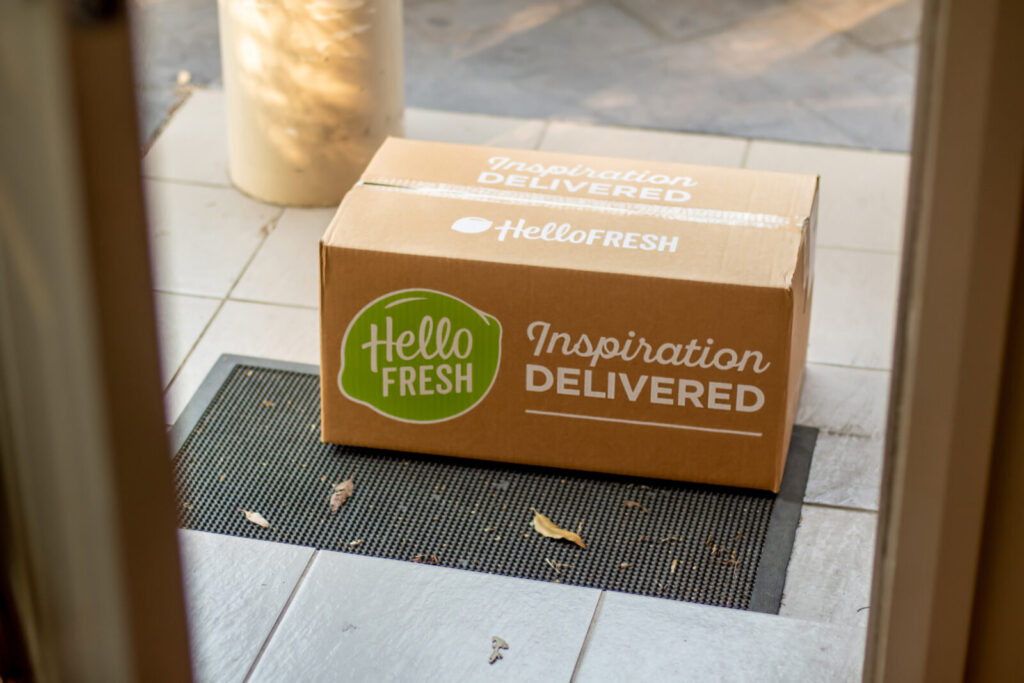Brief • 2 min Read
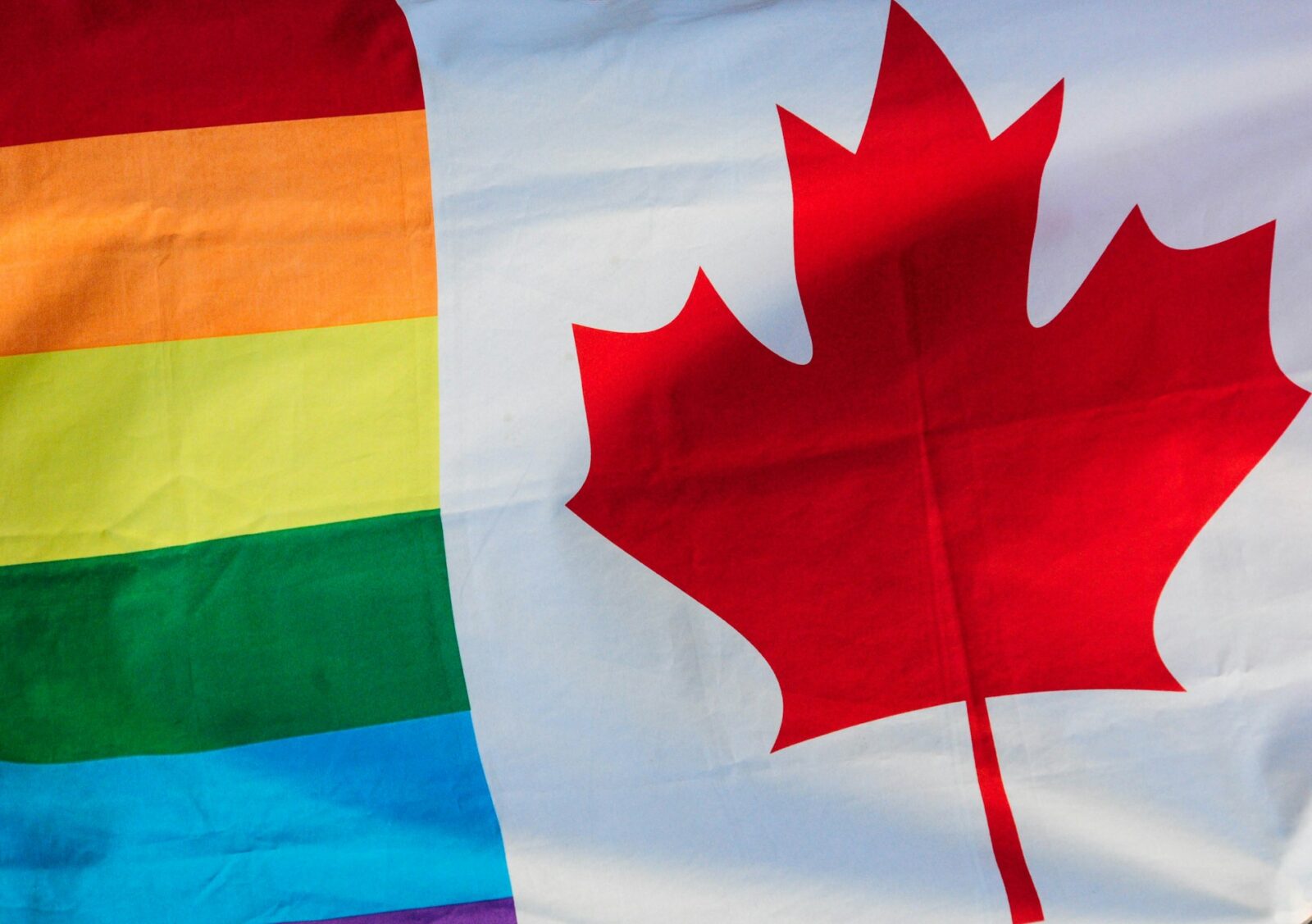
As Canadians, we pride ourselves on our diversity, and oftentimes regard it as our strength, as something that sets us apart on the world stage. As we close out Pride month, how well do we see our 2SLGBTQIA+ community represented in Canadian media?
We spoke to Canadian Screen Industry professionals, many of whom identify as 2SLGBTQIA+ to understand how they feel about portrayal and representation within the Canadian Media landscape.
Representation on Canadian Screens
The importance of 2SLGBTQIA+ representation of Canadian screens is universally accepted by the professionals we spoke to.
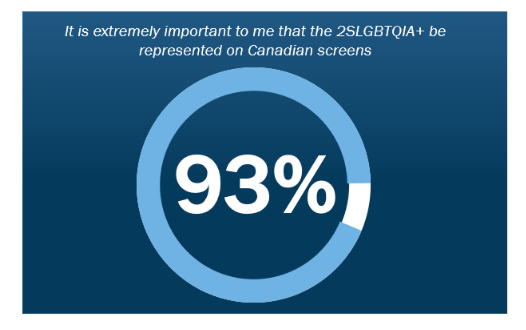
Despite the importance, all 2SLGBTQIA+ groups are seen as underrepresented on Canadian screens , with gay men seen as less underrepresented as compared to other 2SLGBTQIA+ groups.
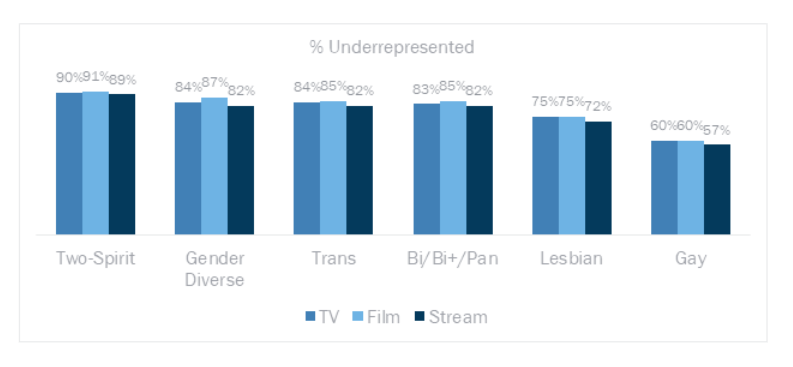
While representation on screen is acknowledged by most (85%) to have improved over the past five years, a significant gap persists. Only 1 in 6 “strongly agree” this is the case. This shows progress but indicates a lot of room for improvement.
Portrayal on Canadian Screens
Representation doesn’t matter just to the individual. Research shows that positive 2SLGBTQIA+ media representation helped transform public opinions about 2SLGBTQIA+ people and feelings about their rights too.
This is strongly corroborrated by the professionals we heard from. Not only do they feel that it increases acceptance and understanding, but the vast majority believe there is a desire from the Canadian public to see authentic 2SLGBTIA+ characters.
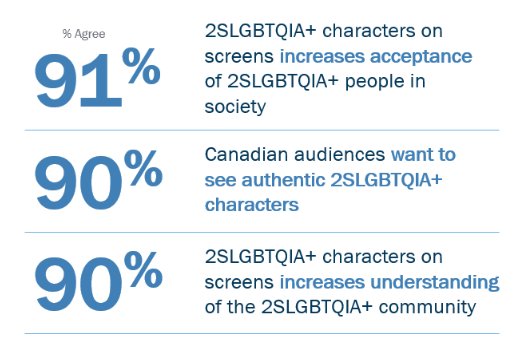
But representation can only be successful in opening hearts and minds if there is care taken in how these characters and storylines are portrayed. Nearly half of Canadian Screen Industry professionals strongly agree and 88% agree (50% strongly) that 2SLGBTQIA+ characters are defined solely by their identity as a 2SLGBTQIA+ person. Further, nearly 9 in 10 agree that the portrayal of the 2SLGBTQIA+ community on screen is often superficial and can often rely on stereotypes.
David Walberg, CEO of the Pink Triangle Press, knows this all too well. He states that “the classic 2SLGBTQIA+ tropes are legendary: Villain. Coward. Predator. Victim. The list goes on. Even in the modern era, we are still too often the sad sack proxy for thinly veiled social issues or the gay best friend existing only to prop up the straight lead.” He continued that “We don’t want to see sanitized characters replace stereotypes; we want complexity, outrageousness, deliciousness, and depth.”
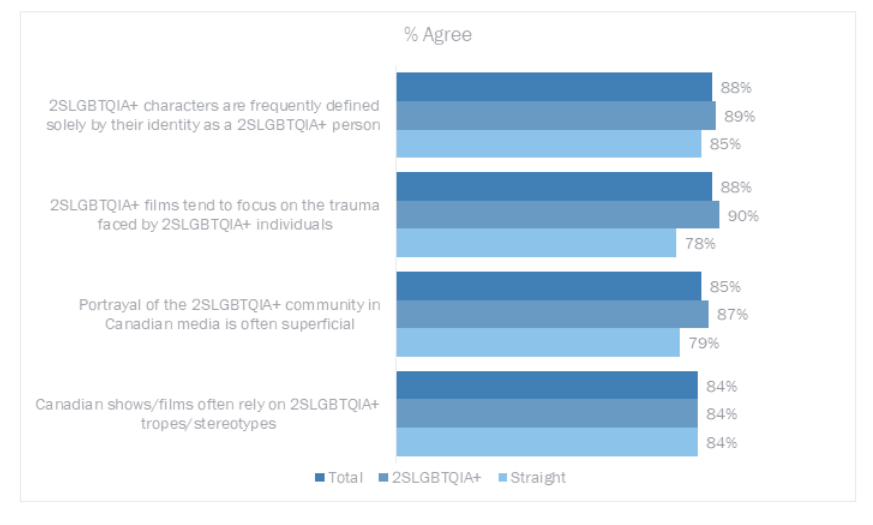
There is a notable gap in attitudes between queer and straight professionals. Yet a strong majority of both feel that 2SLGBTIA+ characters are defined solely by being 2SLGBTQIA+ and as a result their portrayal feels superficial or trauma-focused.
One writer/producer highlighted this challenge
“Finding Canadian content that is not…reductive or tokenizing, or that is harmful to our community or that have the power to give people the wrong perception about who Queer and Trans people are and what our experiences can look like is usually all very trauma informed, and it’s all very negative and backwards. There’s a lot of non-Queer people telling or trying to tell our stories, but there are also Queer filmmakers repeating these narratives because that’s how we’ve learned to see ourselves, and that’s what we think we can offer.”
Conclusion
A final thought from David Walberg “We look forward to this research being part of this important conversation and our hope is that we all use its tools, and our own personal agency, to “catch up to tomorrow” and engage in meaningful shifts in 2SLGBTQIA+ representation in Canadian media.”
As the writer Chimamanda Ngozi Adichie reminds us, “The single story creates stereotypes, and the problem with stereotypes is not that they aren’t true, but they are incomplete. They make one story become the only story.” Giving Canadian audiences more authentic representation of the 2SLGBTQIA+ as intersectional, nuanced and real individuals is a key building block to acceptance.
Methodology
This multi-phase research study was conducted on behalf of the Pink Triangle Press and in partnership with Signal Hill Insights.
A 10-minute online survey of industry professionals who work directly in the TV, Streaming, Film and Gaming industry or in roles supporting the Canadian Media industry, with n=479 completes. In field from April 9-May 1, 2024. Sample was sourced using shares on social media, newsletters and snowball sample as well as direct shares via industry associations. The sample has a high proportion of 2SLGBTQIA+ professionals (self-identified).
About Pink Triangle Press
Pink Triangle Press (PTP) is one of the longest-publishing 2SLGBTQIA+ media groups in the world. Our primary aim is to inspire our communities to pursue a future where everyone is free to celebrate who they are. PTP was founded on the understanding that storytelling and sharing experiences is a powerful tool for liberation.
Subscribe for more Insights
Subscribe to our newsletter for the latest trends in business, politics, culture, and more.
Subscribe for more Insights
Subscribe to our newsletter for the latest trends in business, politics, culture, and more.
Related Content






